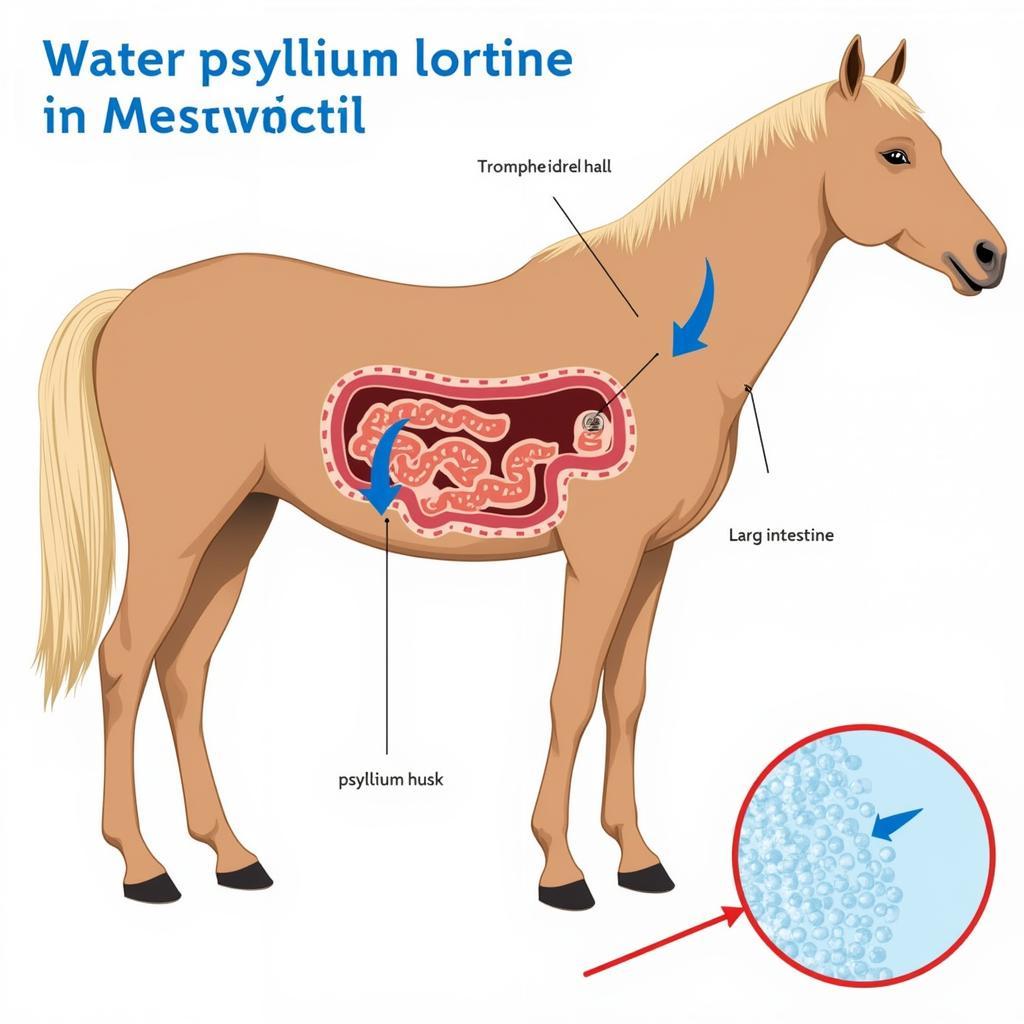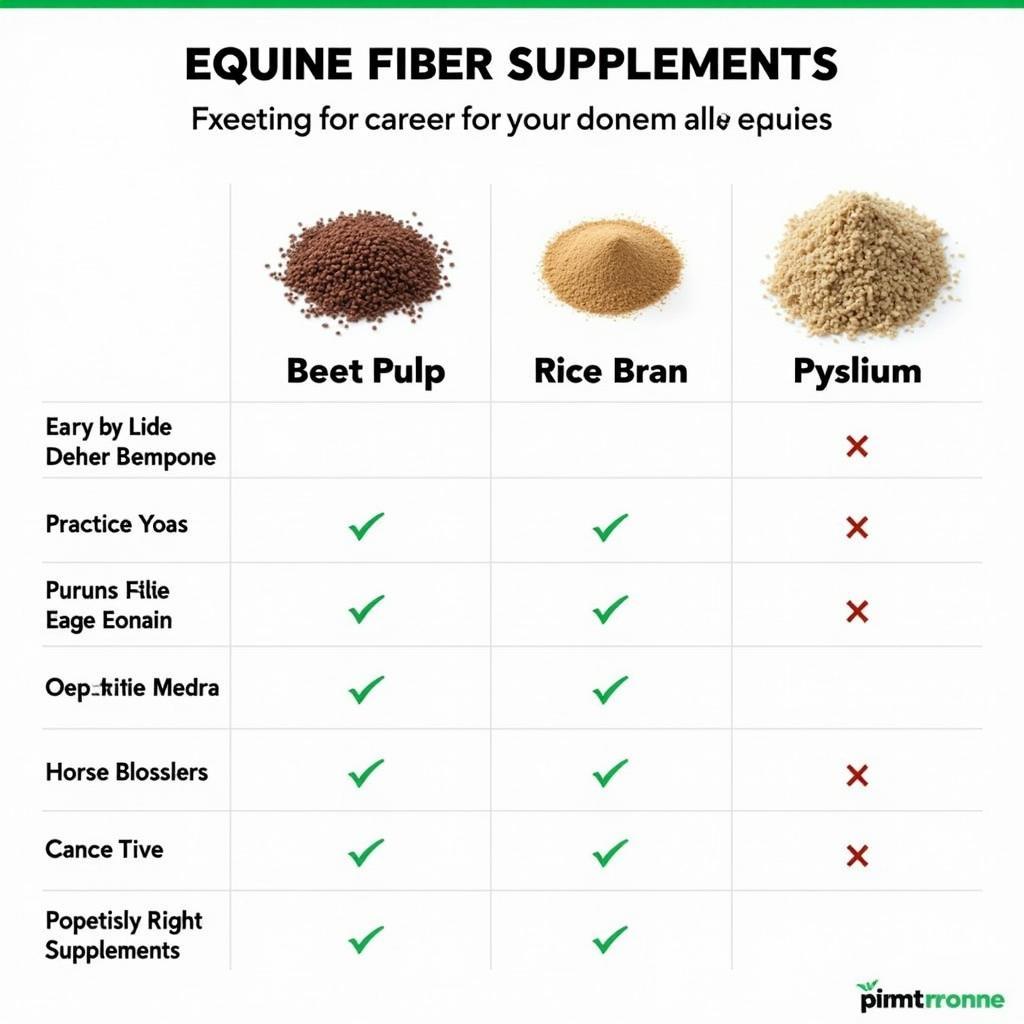Metamucil, a common fiber supplement for humans, is sometimes considered for use in horses. This article delves into the potential benefits, risks, and best practices regarding Metamucil For Horses, providing horse owners with the information they need to make informed decisions about their horse’s digestive health.
Understanding Metamucil and Its Ingredients
Metamucil’s primary ingredient is psyllium husk, a soluble fiber derived from the seeds of the Plantago ovata plant. Psyllium absorbs water in the digestive tract, forming a gel-like substance that can aid in regulating bowel movements. This can be beneficial for both humans and animals experiencing constipation or diarrhea. However, it’s crucial to understand the specific needs of horses before administering any human-intended supplement.
Can Horses Take Metamucil? Benefits and Risks
While Metamucil isn’t explicitly formulated for horses, some horse owners use it to address specific digestive issues. The increased fiber can potentially help with sand colic prevention by aiding in the expulsion of sand from the gut. It may also offer relief from mild constipation.
However, there are potential risks associated with using Metamucil for horses. The primary concern is the potential for impaction if the horse isn’t adequately hydrated. The psyllium husk absorbs water, and if not enough water is present, it can solidify in the digestive tract, leading to a blockage.
 Metamucil and Horse Digestive System
Metamucil and Horse Digestive System
Administering Metamucil to Horses: Dosage and Precautions
If you’re considering using Metamucil for your horse, it’s essential to consult with your veterinarian first. They can assess your horse’s individual needs and determine the appropriate dosage, if any. Generally, a smaller dose than what is recommended for humans is used for horses. It’s crucial to ensure your horse has access to plenty of fresh, clean water throughout the day, especially when administering Metamucil.
Alternatives to Metamucil for Horses
Several equine-specific fiber supplements are available that are specifically formulated for horses’ digestive systems. These products often contain a blend of fibers and other beneficial ingredients to support overall digestive health. Some examples include beet pulp, rice bran, and commercially available psyllium-based supplements designed for horses.
 Equine Fiber Supplements Comparison
Equine Fiber Supplements Comparison
Sand Colic Prevention and Treatment in Horses
Sand colic is a serious concern for horses that graze in sandy areas. While Metamucil might offer some benefit in sand expulsion, it shouldn’t be relied upon as the sole preventative measure. Regular management practices, such as providing mats for feeding and minimizing grazing in sandy areas, are crucial for preventing sand colic.
Is Metamucil a Cure-all for Sand Colic?
No, Metamucil is not a cure-all for sand colic. If your horse exhibits signs of colic, including pawing, rolling, flank watching, and loss of appetite, immediate veterinary attention is necessary.
Conclusion
Metamucil for horses can be a complex topic. While it may offer some benefits for specific digestive issues, it’s crucial to consult your veterinarian before administering it to your horse. Ensuring adequate hydration is paramount to avoid potential complications like impaction. Equine-specific fiber supplements and proper management practices are often safer and more effective solutions for promoting optimal digestive health in horses.
FAQ
- What is the primary ingredient in Metamucil? (Psyllium Husk)
- What is the main risk of using Metamucil for horses? (Impaction due to dehydration)
- Should I consult a vet before giving my horse Metamucil? (Yes, absolutely)
- What are some alternatives to Metamucil for horses? (Beet pulp, rice bran, equine-specific psyllium supplements)
- Is Metamucil a cure for sand colic? (No)
- How can I prevent sand colic in my horse? (Management practices like feeding on mats and avoiding sandy pastures)
- What are the signs of colic in horses? (Pawing, rolling, flank watching, loss of appetite)
Need help with your horse’s digestive health? Contact us! Phone: 0772127271, Email: [email protected] Or visit us: QGM2+WX2, Vị Trung, Vị Thuỷ, Hậu Giang, Việt Nam. We have a 24/7 customer service team.